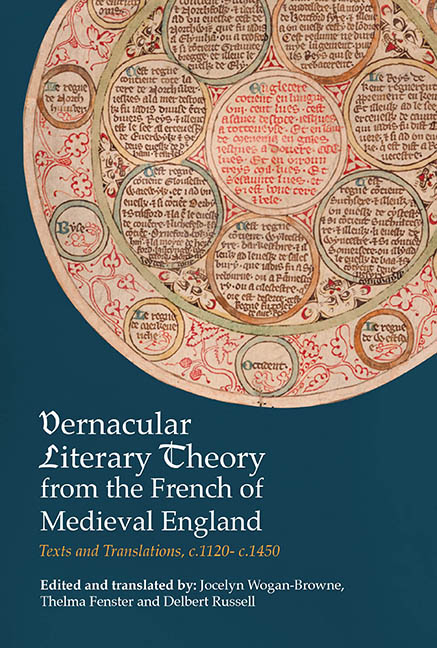 Vernacular Literary Theory from the French of Medieval England
Vernacular Literary Theory from the French of Medieval England Book contents
- Frontmatter
- Dedication
- Contents
- List of Maps and Illustrations
- Preface
- Abbreviations
- Map
- General Introduction
- Establishment of Texts and Translations and Conventions Used
- Part I Faus franceis and dreit engleis: On Language
- Part II Si sa dame ne li aidast: Authorship and the Patron
- Part III Primes dirrum la dreyte fei: The Conduct of Reading, Hearing and Seeing
- Part IV Ki veult oïr: Forming Audiences and Creating Textual Communities
- Part V Si come en latyn trovay escrit: The Lineage of the Text
- Postlude. Honneurs publiées … en divers royaumes
- Part VI Essays and Resources
- Timeline
- Glossary
- Bibliography
- General Index
- Index of Manuscripts
Part V - Si come en latyn trovay escrit: The Lineage of the Text
Published online by Cambridge University Press: 25 October 2017
- Frontmatter
- Dedication
- Contents
- List of Maps and Illustrations
- Preface
- Abbreviations
- Map
- General Introduction
- Establishment of Texts and Translations and Conventions Used
- Part I Faus franceis and dreit engleis: On Language
- Part II Si sa dame ne li aidast: Authorship and the Patron
- Part III Primes dirrum la dreyte fei: The Conduct of Reading, Hearing and Seeing
- Part IV Ki veult oïr: Forming Audiences and Creating Textual Communities
- Part V Si come en latyn trovay escrit: The Lineage of the Text
- Postlude. Honneurs publiées … en divers royaumes
- Part VI Essays and Resources
- Timeline
- Glossary
- Bibliography
- General Index
- Index of Manuscripts
Summary
Introduction
Latin's pervasive use as an authorising language is clear in our texts, and it is an important ‘other’ in French texts, as discussed in Part I above (pp. 10–11). Nevertheless, in Part V, as throughout the volume, the diversity with which the question of textual lineage is handled is striking. A number of other languages are invoked as part of textual lineage, including (as discussed above in Part I, pp. 10, 14) English and British. The Greek authorising figures of Aristotle and Alexander are unsurprisingly found in many works with eastward-turning textual communities in Part IV: not only the encyclopaedic romance of the Roman de toute chevalerie (28), or the Secré de secrez (33) with its mirror for princes, but (32a), a treatise on menstruation, deploy Aristotle. For its defence and prescription of cosmetic remedies, the Ornatus mulierum (32b) cites a still more complicated textual lineage: the written authority of ancient Greek medicine (Galen, Hippocrates), Latinised Arabic medicine (Constantinus Africanus) and the direct oral teaching of a Saracen woman and that of ‘Trota’ at Salerno. When Part V's Simund de Freine considers how linguistic diversity limits earthly fame (Roman de Fortune (38), late twelfth century), he ranges over Lombard, Greek, Hebrew, Latin, Spanish, Danish, Scots and English.
The late twelfth and thirteenth century's intensified attention to the languages of the Mediterranean can be characterised by ambivalence or strategy. For all the power of Aristotle's name, in the late-thirteenth-century pseudo-Aristotelian Secré de secrez (33.31–6) both Greek and Arabic are treated as unreliable: Arabic is said to be too elaborate and unverifiable as to its truthfulness and Greek too obscure. (Waterford and Copale may not actually have translated from the Arabic or the Greek: these claims more probably concern the effects of these languages in the Latin source and thus serve to legitimate the Latin basis for the French-language translation, the Latin translator's competence, and the practice of making omissions or supplementing the translation (33.63–76)). These linguistic judgements of course also present the Secré as a work au fait with the new sources of knowledge in the thirteenth century's expanded world, and in spite of Secré's claim of unreliability, Arabic is often used to code knowledge as both exotic and authentic.
- Type
- Chapter
- Information
- Vernacular Literary Theory from the French of Medieval EnglandTexts and Translations, c.1120- c.1450, pp. 341 - 387Publisher: Boydell & BrewerPrint publication year: 2016


